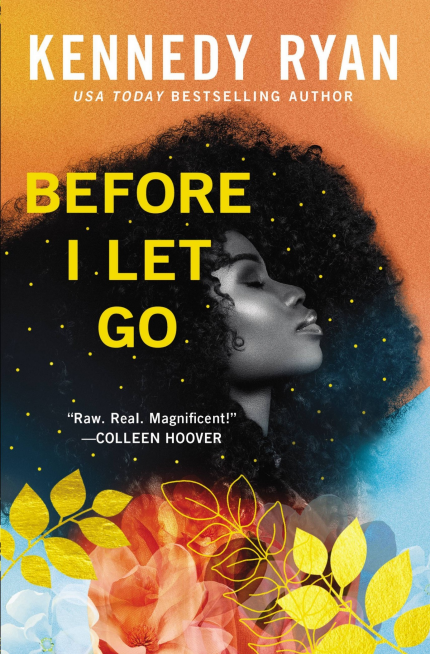Before I Let Go (Skyland #1), by Kennedy Ryan

Before I Let Go by Kennedy Ryan
My rating: 3 of 5 stars
I wish I could have enjoyed “Before I Let Go” by Kennedy Ryan more than I did because there is a lot to like in it: Yasmen and Josiah Wade are divorced after suffering devastating losses and finding out they’re incompatible in their respective grieving. Nevertheless, they run a successful restaurant together and do their best at co-parenting. So far, so good.
Told in dual points of view, from both Yasmen’s and Josiah’s perspectives, the novel—very obviously a second chance romance—tells the story of how both grow and, ultimately, find their way back together.
In terms of writing, I have absolutely no complaints: Ryan’s prose is confident and elegant. Depending on the perspective and context, she succeeds in striking the right tone: sometimes clear and straightforward, sometimes light and playful, sometimes metaphorical and powerful.
»That kind of depression is blunter than sadness. Sharper than misery. It is the impenetrable dark of midnight deepened with the blackest strokes of blue—a bruise on your spirit that seems like it will never fade. Until one day…it finally does. With the help of the woman on-screen, it did.«
Having grappled with depression myself for most of my life, I have a sliver of comprehension (because depression is different for everyone) both intellectually and emotionally about what Ryan addresses. I very much appreciate the raw honesty with which this complex topic is approached here. Ryan writes sensitively, empathetically, and honestly about it. A central point is the willingness—despite initial scepticism—to seek professional help and go to therapy.
The importance of seeking and getting professional help cannot be overstated and not repeated often-enough.
»It is not an exaggeration to say Dr. Abrams—with her always-on-point silk-pressed hair, fashionable blouses and pencil skirts, and watching, wise eyes—changed my life. I trust her implicitly, and she has taught me more about trusting myself.«
All those years ago, I was hesitant. Therapy? For me? What’s that supposed to do? And isn’t that conceding failure? No, it isn’t. I was anxious about it at first, too, and when I took up therapy again a few years ago, I was anxious again—despite knowing better. Today, I’m better in every single department of my life—and YOU could be, too! (And I don’t mind communicating about it so if you “need an ear”, feel free to contact me.)
I really liked Yasmen because despite her losses and resulting grief (which I cannot even start to comprehend), she is still around. When she finally knows what she wants, she finds her authentic voice and communicates admirably.
Josiah on the other hand is very much in avoidance, in denial, and self-chosen isolation. I understand he’s afraid of loss and almost mortally afraid of opening those “boxes” in his mind he uses to compartmentalise. I had a hard time enjoying his rather quick change from rough and blunt “alpha male” to “can you see me at almost no notice?” person in therapy.
I also found out I don’t like “second chance” scenarios: Both Yasmen and Josiah try to move on despite still feeling very strongly about each other. Their respective love interests felt like “stuffing material” and, for me, didn’t add much to the story but instead distracted from it. This is me and not the novel but I strongly disliked both of them.
I still feel strongly conflicted about the way Ryan spells out everything in detail: I often found myself wishing she would have just let some observations stand on their own (which they easily could have) without spelling their significance out. On the other hand, when I just went looking for an example, I found myself conflicted again and failed at choosing because perhaps it is, in fact, necessary.
I liked Yasmen’s and Josiah’s children Kassim and Deja (and, as a father myself, found them depicted convincingly), and, surprisingly for me, they really added to the story and made the entire novel more convincing and authentic.
There are a few minor niggles I must not fail to mention because they round out the picture: Yasmen’s original wedding ring is described as a “simple gold band and chip diamond ring”—modest, humble, and perfect. The new ring is a “large square-cut diamond on a thick platinum band”. The kids go to an expensive private school and one of them is only reluctantly permitted to enrol in a public school. And yet, Ryan makes Josiah say this:
»“Rich guys, Yas. Privileged men used to getting what they want whenever they want all the time.”
“Some might argue, considering the car you drive, the neighborhood you live in, the clothes you wear, and the cash you drop on sneakers without blinking, that you’re a rich guy yourself.”«
This results in cognitive dissonance because it feels like the author is trying to have it both ways—critiquing wealth and privilege while the characters themselves appear to be privileged. It feels like it’s undermining the authenticity of the story.
Despite it all, “Before I Let Go” remains an engaging and worthwhile read. It’s just not a story or scenario I’m enjoying very much. Your mileage may vary.
Three stars out of five.